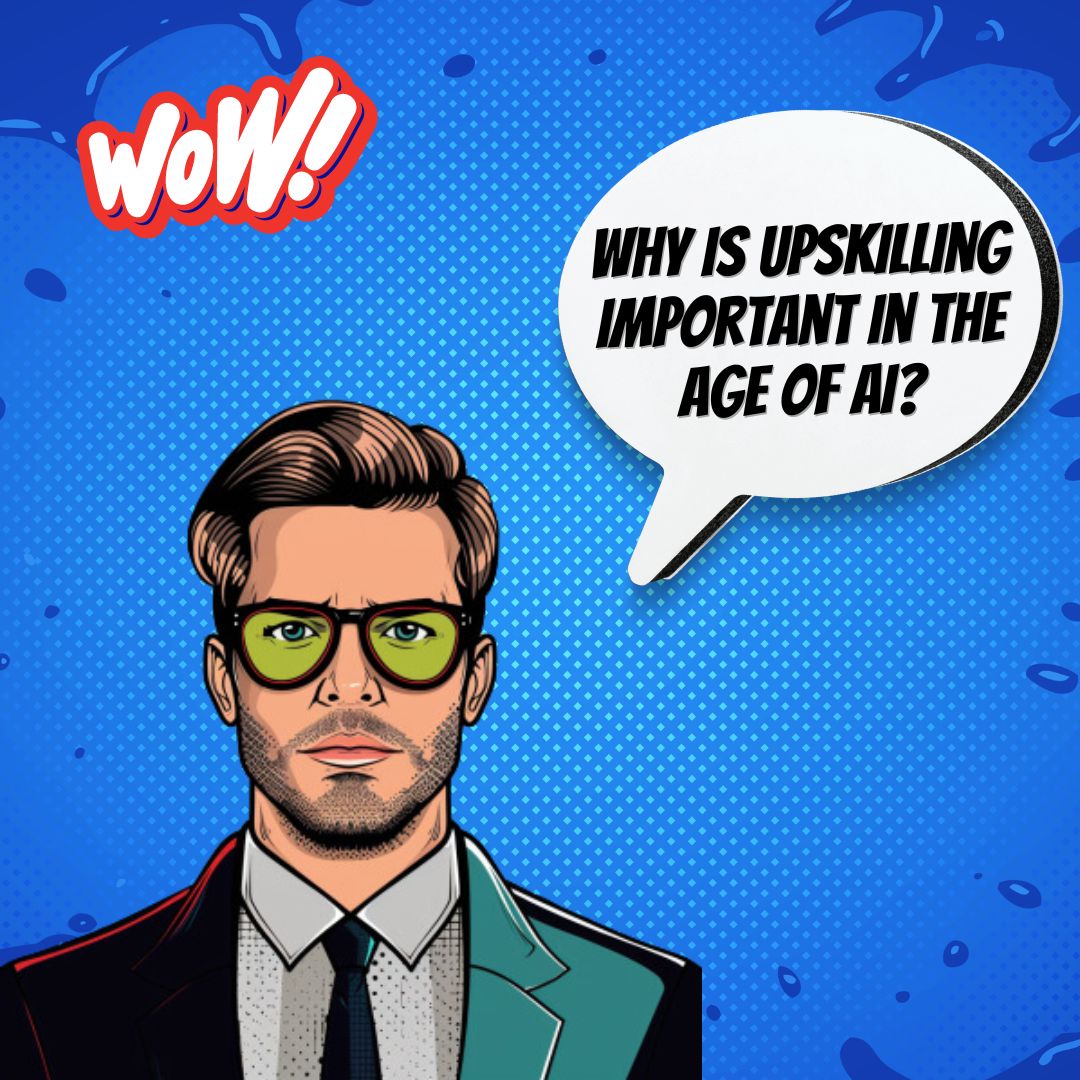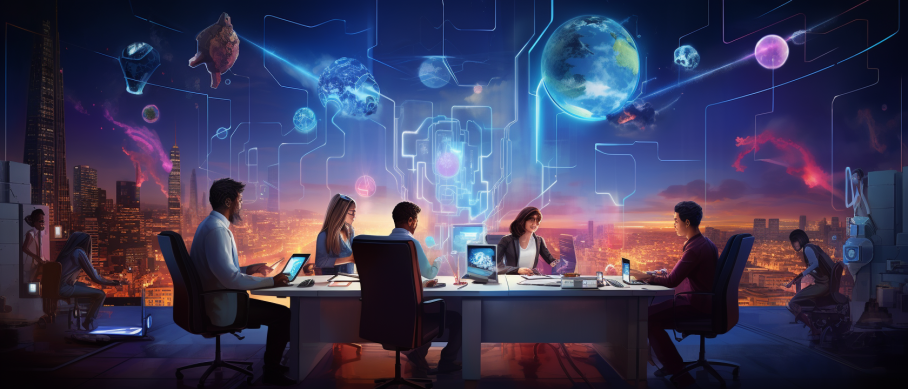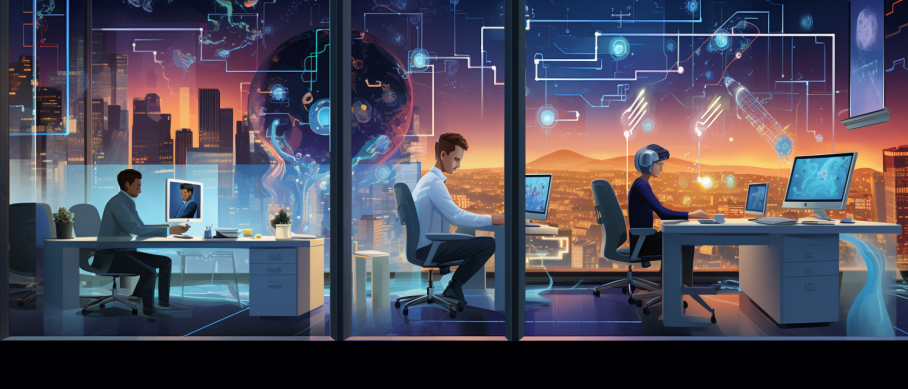Key Takeaways
✅ Emphasis on Lifelong Learning: With AI reshaping careers at a dizzying pace, staying sharp means learning continuously. Discover how to integrate lifelong learning into your routine and why it could be your career lifesaver.
✅ Focus on Transferable Skills: What skills will be your career Swiss Army knife? Find out which abilities will open doors in the AI-powered job market and how to polish them to shine in any scenario.
✅ Collaboration Between Employers and Employees: It takes two to tango, right? Learn how shared efforts can lead to massive leaps in skill development and prepare you for an AI-centric corporate landscape.

Introduction
Have you ever felt like technology is moving so fast you can barely keep up? Think about Artificial Intelligence (AI) — it's not just a buzzword anymore; it's the whirlwind transforming how we work and live. Upskilling and reskilling aren't just fancy terms; they're lifeboats in this sea of change. But how do you start? Why should you care? Let's dive into the journey of adapting to this new reality.
The future is now, and it speaks AI. From self-driving cars to smart assistants, AI isn't just changing jobs; it's creating new ones while retiring old ones. The critical question is, do you have the skills to stay afloat in this wave of innovation? Whether it's sharpening your existing know-how or jumping into a different career path, there's a route for everyone willing to take the helm. In this article, we'll guide you through the maze that is upskilling and reskilling for the age of AI, serving up actionable insights and showing you not just how to survive but how to thrive. Ready to uncover secrets that can propel your career to new heights? Let's get started with the keys to unlock your potential in the world where AI sits at the head of the table.

Top Statistics
| Statistics | Insight |
|---|---|
| Global AI in Education Market Size: Expected to grow from $2.2 billion in 2020 to $11.3 billion by 2026. (Source: MarketsandMarkets) | The accelerating growth in AI for education suggests a significant transformation in how we learn and teach, preparing the workforce with AI-compatible skills. |
| CEO Concerns on Key Skills: 74% of CEOs are concerned about the availability of key skills. (Source: PwC) | This concern reflects the importance of aligning employee capabilities with the evolving technological landscape. |
| Workforce Transition: Up to 375 million workers may need to change occupational categories by 2030 due to AI. (Source: McKinsey) | Such a large-scale transition underlines the necessity for proactive reskilling and upskilling initiatives to prepare for future job market demands. |
| HR Leaders and AI Investment: 54% of HR leaders are investing in AI for upskilling/reskilling. (Source: Gartner) | HR leaders are on the frontlines of embracing AI tools to ensure talent readiness and competitiveness. |
| Employee Learning and Development: 94% of employees would stay longer at a company that invests in their development. (Source: LinkedIn Learning) | Investment in learning and development doesn't just empower workers; it's also a powerful tool for retention in a competitive job market. |
Understanding the Future of Work
Ever catch yourself daydreaming about what jobs will look like in ten, twenty years? With artificial intelligence (AI) stepping into our work boots, some folks are nervous about jobs disappearing. But you know what? It's not all doom and gloom. AI's creating new roles and industries that haven't even been dreamed up yet. And these jobs will need people with a set of high-demand skills – think problem-solving, emotional intelligence, and, yep, even AI literacy. The trick is figuring out which skills you'll need to stay in the game. So, what's your move when a robot learns to do your job? Well, that's where upskilling and reskilling come into the picture.

Upskilling: Enhancing Existing Skills
Let's talk about upskilling. It's like giving your current job skills a turbo boost to keep up with new technology. Say you're a marketing whiz; learning about data analytics could make you even more of an asset to your team. Where do you pick up these skills? Online courses and certifications are your best friends here. They're convenient, and they offer a taste of the new tech that's shaping your industry. Companies are waking up to this too. Many are rolling out upskilling initiatives to make sure their teams don't fall behind as AI marches on.
Reskilling: Transitioning to New Roles
But what if your job changes so much that it kind of… disappears? That's where reskilling is your lifeline. It's like a career shape-shift; you're morphing your existing skills to land a brand-new gig. Got solid people skills? Those can be gold in roles that AI can't touch – like mentoring or coaching. The key is identifying what you're already good at and learning how to punch it up. This isn't about jumping into a completely different industry (unless you want to), but rather leveraging what you know to keep riding the wave of change.

The Role of Education and Training
Every superhero needs a sidekick, right? In the story of your career, think of education and training as your trusty companions. They're essential for keeping skills fresh and staying agile as the job landscape morphs. The cool part? There's a whole world of programs designed to transfer AI-knowhow under your belt. And it's a team effort – industry bigwigs, governments, and schools are all huddling up to make sure these training programs are up to snuff. So whether you're dipping your toes in beginner's courses or diving deep into advanced studies, lifelong learning is the name of the game.
Creating a Culture of Continuous Learning
Imagine a workplace where learning new stuff is as common as your morning cup of joe. That’s the essence of a culture of continuous learning. Companies that get this right are the ones who come out on top. They nurture a growth mindset, where employees are encouraged to experiment, make mistakes, and evolve. So, how do you get there? Start small. Maybe set up a lunch-and-learn session or get some subscriptions to online learning platforms. It's all about fostering an environment where staying curious isn’t just accepted, it’s expected.

AI Marketing Engineers Recommendation
Recommendation 1: Prioritize Data Literacy Across All Levels of Your Organization: The foundation for thriving in the AI era is data. As AI systems feed on data, ensuring that your employees understand how to interpret and utilize data is crucial. Equip your team with the ability to read, understand, analyze, and communicate through data. Did you know that according to recent studies, companies that foster data literacy are more likely to report an improvement in decision-making? That’s no small feat in an era where every choice can change the game.
Recommendation 2: Create An AI-Augmented Workforce by Integrating Soft Skills Training with Technical Upskilling: It’s not all about programming or understanding algorithms. AI isn't replacing humans; it's augmenting them. In this symbiosis, soft skills like critical thinking, problem-solving, emotional intelligence, and adaptability become more valuable than ever. Current trends indicate that these human-centric skills are in high demand amid the AI surge. Why? Because they’re the skills AI can't easily replicate. Nurturing this unique human talent can be the differentiator for your workforce's future-readiness.
Recommendation 3: Implement Continuous Learning Platforms Leveraging AI for Personalized Learning Paths: Personalization is the key in our fast-paced world. One-size-fits-all? That approach is ancient history. Consider using AI-powered learning platforms that tailor skill development to the individual. Tools like Coursera for Business, LinkedIn Learning, or Pluralsight are examples that provide customizable learning experiences. And guess what the bonus is? Employees feel valued because the company invests in their personal growth, leading to better engagement, loyalty, and, ultimately, a more competitive position in the market.

Relevant Links
- Unlock Affiliate Marketing Riches: Your 2024 Blueprint
- ChatGPT Unleashed: Free vs Paid Analysis for Your Needs
- ChatGPT's Revolutionizing Role in Crafting Engaging Marketing Content
- The Future of SEO: How AI Takes Rankings to New Heights
- The Secret Weapon of Small Businesses: How ChatGPT Spurs Growth
- Top Digital Marketing Trends of 2024: Get Ahead of the Curve
- AI's Cutting Edge: Transforming Marketing Analytics for the Better
- The AI Drive: Steering Your Google Ads Towards High Conversions
- The Ethical Frontier: Navigating AI's Role in Marketing with Care
- AI and the Brand Odyssey: Sculpting Identities in the Digital Age
Conclusion
We've journeyed through the ins and outs of staying afloat in a world where artificial intelligence is reshaping how we live and work. Do you feel that breeze of change? It's the gust of AI, and it's been steadily building up, promising to usher in a wave of new roles and industries. But here's the million-dollar question: Are you ready to ride that wave?
Upskilling and reskilling are much more than buzzwords; they're your ticket to not just surviving but thriving in this shift. It's about enhancing what you know and embracing what you don't, yet. Think about it — when was the last time you learned something new? And I mean really dove headfirst into unfamiliar territory?
It's time to realize that the learning game has changed. It's no longer a once-in-a-while thing; it's an all-the-time kind of deal. Companies are starting to get this, fostering environments where learning is just part of the job. But how about you? Are you ready to adopt that growth mindset that keeps you curious and on your toes?
As the finale of our talk, let's drum up the courage to say 'yes' to learning, whenever, wherever. Whether you're eyeing an upskill to enhance your current role or a reskill to jump into new, uncharted professional waters, remember that the future doesn't wait for anyone. It's up to individuals, organizations, and society to link arms and march forward into the age of AI with determination.
So, what's your next move? Will you stand by as the world zips by, or will you be the one charting a course towards a future where your skills shine bright against the backdrop of the AI revolution? Let's make a pact here and now: to never stop learning, because when it comes to the age of AI, it's not just about keeping up; it's about leading the way.

FAQs
Question 1: What is the difference between upskilling and reskilling?
Answer: Upskilling is all about jazzing up the skills you already have to stay on top of the tech game, while reskilling is like learning a whole new dance routine to switch up your career or dive into fresh opportunities.
Question 2: Why is upskilling and reskilling important in the age of AI?
Answer: Look, AI's like a whirlwind shaking up industries left and right. Upskilling and reskilling are the lifeboats keeping us afloat, making sure we're not left treading water as jobs transform and new roles pop up.
Question 3: What are the most in-demand AI-related skills for the future workforce?
Answer: The future's all about data—slicing it, dicing it, and making it tell stories. So, skills like data analysis, machine learning, playing around with languages (we're talking Python, R, Java, not French or Spanish), and making data look good (hello, data visualization!) are super hot right now.
Question 4: How can professionals identify the skills they need to upskill or reskill for the future?
Answer: It's like piecing together a puzzle. Keeping an eye on where things are headed, poring over job ads, asking for some good old-fashioned advice from those in the know, and taking a long, hard look in the mirror to spot where you can beef up your skillset.
Question 5: What are the best resources for upskilling and reskilling in AI?
Answer: The internet's a treasure trove with online courses, boot camps where you get down and dirty with learning, shiny certifications you can show off, brainy conferences, and virtual hangouts with other pros.
Question 6: How can professionals balance their current job responsibilities with upskilling or reskilling efforts?
Answer: Juggling skills and bills, eh? Set bite-sized goals, make time your best friend, find learning options that bend with your schedule, and don't shy away from asking your work buddies or boss for help.
Question 7: What are the potential challenges associated with upskilling and reskilling in AI?
Answer: It's not all smooth sailing—you've got to shell out some cash and time, wrap your head around new tricks that might not come easy, and face the music that jobs aren't immune to our robot pals taking over.
Question 8: How can employers support their employees in upskilling and reskilling for the future?
Answer: Bosses can throw their weight behind training sessions, give you some wiggle room in your work schedule, cheer on learning every day on the job, and maybe even sweeten the deal with perks for leveling up your skills.
Question 9: What are some examples of successful upskilling and reskilling programs in the age of AI?
Answer: Giants like Amazon are raising the bar with their Upskilling 2025 plan, Microsoft's schooling businesses on AI, and IBM's stepping up with SkillsBuild to keep everyone in the loop with what's next.
Question 10: What is the role of government and educational institutions in promoting upskilling and reskilling for the future workforce?
Answer: The big guys in government and the brains in academia can pump money into AI research, keep classroom lessons snappy and relevant to what's out there, and give a leg up to anyone looking to buff up their skill set with some financial aid.

Academic References
- World Economic Forum. (2020). The Future of Jobs Report 2020. This comprehensive report sheds light on the swift evolution in the job market driven by AI and automation, emphasizing an impending need for upskilling and reskilling. By 2025, it anticipates that half of all employees will need new skills to stay in the game and maps out the skills that will be most sought after in the near future.
- Accenture. The AI-Augmented Workforce: How Artificial Intelligence is Enhancing Human Productivity. This insightful analysis delves into how AI is revolutionizing the workforce and underscores the significance of reskilling for adapting to novel job roles. It champions a synergistic "human+machine" relationship, advocating for personnel to acquire the necessary skills for effective collaboration with AI systems.
- Gallup. The State of the American Workforce. This report tackles the current situation of the American workforce and underscores the critical need for upskilling and reskilling. It brings to the forefront the necessity of continuous learning and development avenues for staying competitive amidst the advent of AI and automation.
- Pearson & Nesta. The Future of Skills: Employment in 2030. Taking a futuristic approach, this report forecasts the landscape of employment and the essential skills for 2030. It highlights the imperative of reskilling and upskilling to maintain competitiveness, suggesting that workers will need to be flexible and lifelong learners.
- McKinsey Global Institute. Skills for the Future: Managing Transition. This report investigates how automation and AI are transforming the workforce and the requisite of reskilling and upskilling. It intimates that a diverse combination of technical, social, and emotional skills will be indispensable for staying ahead of the curve in the upcoming times.





